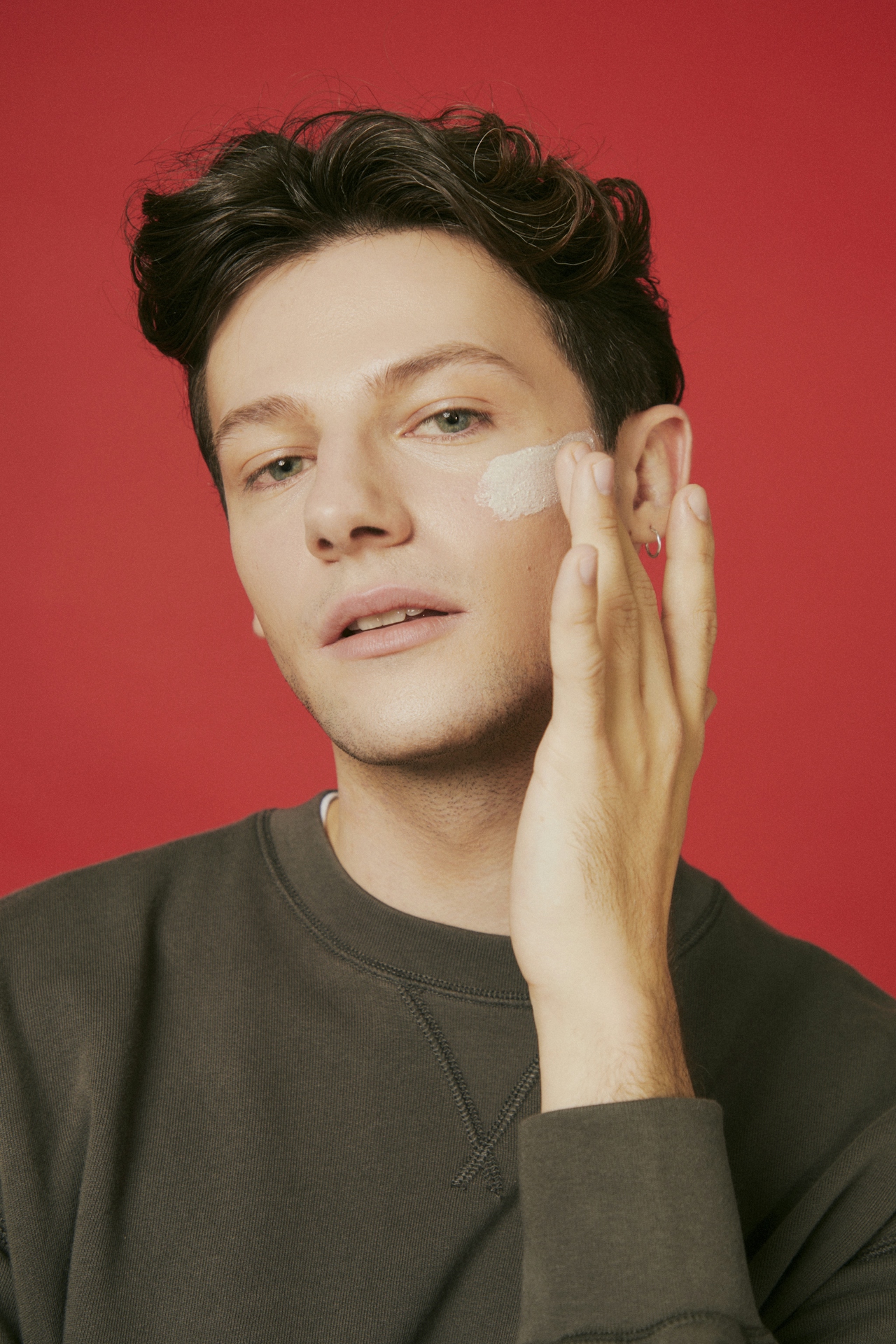- What is an Oil Cleanser? And How Does it Work?
- Oil Cleanser vs. Cleansing Balm: What’s the Difference?
- The Benefits: What Does Oil Cleanser Do to Your Skin?
- Can All Skin Types Use Cleansing Oils?
- Can Oil Cleansers Cause Acne?
- Choosing the Right Oil Cleanser for Your Skin Type
- The Art of Oil Cleansing: A Step-by-Step Guide to using Oil Cleansers
- Oil Cleansing: The Final Verdict
Let’s talk about a product that’s been generating a lot of buzz lately: oil cleansers. You may have seen them in your favourite beauty shop or heard rumours about how magically well they remove makeup. But are they worth the hype? And, more importantly, should you be adding one to your skincare routine?
This ultimate guide has got you covered when it comes to answering all your burning questions about oil cleansers. Let’s explore what they are, how they work, and if they’re a good fit for your specific skin type. Let’s jump right into it!
What is an Oil Cleanser? And How Does it Work?
An oil cleanser is a type of facial cleanser that uses oils to dissolve and remove makeup, dirt, and excess sebum from your skin.
So, how does cleansing oil work on the skin?
Unlike traditional foaming cleansers, which can sometimes strip the skin of its natural oils, cleansing oils work by using the “like dissolves like” principle.
Makeup, sunscreen, and environmental pollutants are often oil-based. A cleansing oil attracts and dissolves these oils and impurities, gently removing them from your skin without stripping away its natural moisture.
In simpler terms, the oils in the cleanser are like magnets for the oils on your skin. They grab onto them and whisk them away, leaving your skin feeling clean, refreshed, and oh-so-soft!
Oil Cleanser vs. Cleansing Balm: What’s the Difference?
Before we explore the wonderful world of oil cleansers, let’s clear up a common confusion: oil cleansers vs. cleansing balms. Both are fantastic first-cleanse options, but they differ slightly in texture and application.
- Cleansing Oils: Oil cleansers are, well, oils! They come in liquid form and tend to be lightweight and fast-absorbing on the skin. They can be poured directly onto your hands for application.
- Cleansing Balms: Cleansing balms, on the other hand, have a thicker, more solid consistency that melts into an oil upon contact with your skin. They often feel richer and more luxurious, making them a favorite for those with dry or sensitive skin.
The choice between the two often comes down to personal preference. If you love the feeling of a luxurious oil massage on your face, a balm might be your perfect match. If you prefer a lighter feel, an oil cleanser might be the way to go.
The Benefits: What Does Oil Cleanser Do to Your Skin?
Oil cleansers offer several benefits that make them a worthwhile addition to your skincare routine:
- Deep Cleansing: Effectively removes makeup, sunscreen, and impurities without stripping the skin.
- Hydration: Leaves skin feeling soft and moisturized, helping to maintain the skin’s natural barrier.
- Balanced Skin: Helps regulate oil production for oily skin types, potentially reducing excess sebum.
- Gentle: Less likely to strip the skin of its natural oils compared to traditional cleansers, making them suitable for sensitive skin.
Can All Skin Types Use Cleansing Oils?
The good news: oil cleansers can be a fantastic addition to almost any skincare routine! Contrary to popular belief, they’re not just for dry skin types. Here’s a quick breakdown:
- Is cleansing oil good for dry skin: Oil cleansers are a dream come true for dry skin! They gently cleanse without disrupting the skin’s delicate barrier, leaving it feeling nourished and hydrated.
Studies have shown that oil cleansing can improve skin hydration, and it is more effective than regular cleansing in maintaining skin oil content and acidity. Check out this cheat sheet for dry skin for even more tips on keeping your skin happy and hydrated!
- Is cleansing oil good for oily skin: Believe it or not, oil cleansers can also be your best friend if you have oily skin. They help break down excess oil and unclog pore, without leaving your skin feeling stripped and more prone to producing even more oil.
In fact, this study found that oil cleansing consistently maintains skin hydration. Who wouldn’t want that daily youthful glow?
- Is cleansing oil good for sensitive skin: If you have sensitive skin, it’s always best to patch-test a new product before applying it to your entire face.
- Is cleansing oil good for acne-prone skin: It’s crucial to patch-test any new product to ensure it doesn’t exacerbate your acne. Let’s talk about this a little further.
Can Oil Cleansers Cause Acne?
This is a common concern, especially for those with acne-prone skin. While some people might experience a temporary breakout (purging) when they first start using an oil cleanser, this usually clears up within a few weeks.
This purging happens because the oil cleanser is working to dislodge existing clogs deep within your pores, which can then surface as pimples. As long as you stick with it, your skin should adjust and become clearer overall.
In fact, oil cleansers can actually be beneficial for acne-prone skin by removing excess oil and makeup that can clog pores. The key is to choose an oil cleanser that won’t clog.
So how do you figure out the right cleanser for your skin type?
Choosing the Right Oil Cleanser for Your Skin Type
Now that you have a good knowledge of oil cleansing and its benefits, let’s delve into finding the perfect formula for your unique skin type.
Here’s a breakdown of some popular oil cleanser ingredients and their benefits:
- For Dry Skin: Look for oils that mimic your skin’s natural sebum, such as jojoba oil, sweet almond oil, or rosehip oil. These oils are nourishing and hydrating, leaving your skin feeling soft and supple.
- For Oily Skin: Grapeseed oil or jojoba oil are great choices for oily skin. They’re lightweight and non-comedogenic, meaning they won’t clog pores.
- For Combination Skin: Opt for a lightweight oil blend that won’t be too heavy for the oilier areas. Jojoba oil is a versatile option, or you can look for cleansers formulated with grapeseed oil and camellia seed oil.
- For Sensitive Skin: Stick to oil cleansers formulated with gentle, calming ingredients like jojoba oil or rosehip oil, which have been shown to have anti-inflammatory properties. Avoid harsh fragrances and essential oils, which can irritate sensitive skin.
The Art of Oil Cleansing: A Step-by-Step Guide to using Oil Cleansers
Ready to experience the magic of oil cleansing for yourself? Here’s a step-by-step guide to ensure you get the most out of this cleansing method:
- Apply the Oil: Start with dry hands and a dry face. Pour a small amount of cleansing oil into your palm.
- Massage: Gently massage the oil into your skin using circular motions. Focus on areas with heavy makeup or excess oil.
- Emulsify: Add a bit of water to your hands and continue massaging. The oil will emulsify and turn milky.
- Rinse: Remove all the oil by rinsing thoroughly with lukewarm water.
- Follow Up: Follow with a water-based cleanser if you’re double cleansing, or proceed with your usual skincare routine.
Oil Cleansing: The Final Verdict
Oil cleansers are a fantastic addition to most skincare routines. They offer a gentle yet effective way to remove makeup, sunscreen, and impurities without disrupting the skin’s natural barrier.
Whether you have dry, oily, combination, or even sensitive skin, there’s an oil cleanser out there that’s perfect for you. So ditch the harsh cleansers and embrace the power of oil cleansing for a cleaner, clearer, and healthier complexion!
For more skincare tips and tricks, stay tuned to Skin School. Happy cleansing!
REFERENCES
- Yu, J. Y., Jang, A. Y., & Chang, B. S. (2019). Comparative Analysis of Skin Condition after Using Cleansing Oil and Cleansing Water for Removing Facial Makeup. Medico-Legal Update, 19(2).
- Song, J. H., Kim, B. J., & Choi, E. J. (2010). The actual status of face washing in women in their 20s and 30s and the influence of cleansing oil upon the improvement of their facial skin dryness. Kor J Aesthet Cosmetol, 8(4).
- Ananthapadmanabhan, K. P., Moore, D. J., Subramanyan, K., Misra, M., & Meyer, F. (2004). Cleansing without compromise: the impact of cleansers on the skin barrier and the technology of mild cleansing. Dermatologic therapy, 17, 16-25.
- Rhue, H., & Stuart, E. (2024, April 22). The Perfect Skincare Routine for Dry Skin, Recommended by Dermatologists. Byrdie. https://www.byrdie.com/dry-skincare-routine
- Bell, L. (2012). The Care and Keeping of Sensitive Skin: A Practical Guide to Holistic Skin Care. iUniverse.



